专业学生英文语篇背诵集锦 (1)
- 格式:doc
- 大小:252.00 KB
- 文档页数:76
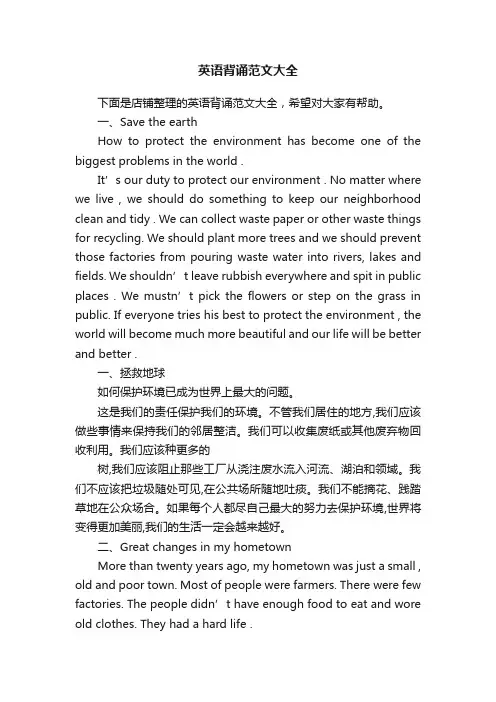
英语背诵范文大全下面是店铺整理的英语背诵范文大全,希望对大家有帮助。
一、Save the earthHow to protect the environment has become one of the biggest problems in the world .It’s our duty to protect our environment . No matter where we live , we should do something to keep our neighborhood clean and tidy . We can collect waste paper or other waste things for recycling. We should plant more trees and we should prevent those factories from pouring waste water into rivers, lakes and fields. We shouldn’t leave rubbish everywhere and spit in public places . We mustn’t pick the flowers or step on the grass in public. If everyone tries his best to protect the environment , the world will become much more beautiful and our life will be better and better .一、拯救地球如何保护环境已成为世界上最大的问题。
这是我们的责任保护我们的环境。
不管我们居住的地方,我们应该做些事情来保持我们的邻居整洁。
我们可以收集废纸或其他废弃物回收利用。
我们应该种更多的树,我们应该阻止那些工厂从浇注废水流入河流、湖泊和领域。
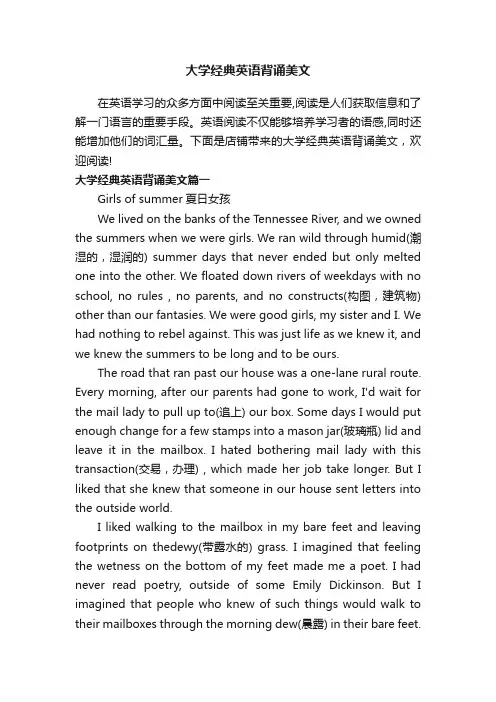
大学经典英语背诵美文在英语学习的众多方面中阅读至关重要,阅读是人们获取信息和了解一门语言的重要手段。
英语阅读不仅能够培养学习者的语感,同时还能增加他们的词汇量。
下面是店铺带来的大学经典英语背诵美文,欢迎阅读!大学经典英语背诵美文篇一Girls of summer夏日女孩We lived on the banks of the Tennessee River, and we owned the summers when we were girls. We ran wild through humid(潮湿的,湿润的) summer days that never ended but only melted one into the other. We floated down rivers of weekdays with no school, no rules , no parents, and no constructs(构图,建筑物) other than our fantasies. We were good girls, my sister and I. We had nothing to rebel against. This was just life as we knew it, and we knew the summers to be long and to be ours.The road that ran past our house was a one-lane rural route. Every morning, after our parents had gone to work, I'd wait for the mail lady to pull up to(追上) our box. Some days I would put enough change for a few stamps into a mason jar(玻璃瓶) lid and leave it in the mailbox. I hated bothering mail lady with this transaction(交易,办理) , which made her job take longer. But I liked that she knew that someone in our house sent letters into the outside world.I liked walking to the mailbox in my bare feet and leaving footprints on thedewy(带露水的) grass. I imagined that feeling the wetness on the bottom of my feet made me a poet. I had never read poetry, outside of some Emily Dickinson. But I imagined that people who knew of such things would walk to their mailboxes through the morning dew(晨露) in their bare feet.We planned our weddings with the help of Barbie dolls and the tiny purple wild flowers growing in our side yard. We became scientists and tested concoctions(调和,混合) of milk, orange juice, and mouthwash(漱口水) . We ate handfuls ofbittersweet(苦乐参半的) chocolate chips and licked peanut butter(花生酱) off spoons. When we ran out of sweets to eat, we snitched sugary Flintstones vitamins out of the medicine cabinet. We became masters of the Kraft macaroni(通心面条) and cheese lunch, and we dutifully called our mother at work three times a day to give her updates on our adventures. But don't call too often or speak too loudly or whine too much, we told ourselves, or else they'll get annoyed and she'll get fired and the summers will end.We shaped our days the way we chose, far from the prying(爱打听的,窥探的)eyes of adults. We found our dad's Playboys and charged the neighborhood boys money to look at them. We made crank(易怒的) calls around the county, telling people they had won a new car. "What kind?" they'd ask. "Red," we'd always say. We put on our mom's old prom(舞会) dresses, complete with gloves and hats, and sang backup to the C.W. McCall song convoy, " which we'd found on our dad's turntable.We went on hikes into the woods behind our house, crawling under barbed wire fences and through tangled undergrowth. Heat and humidity(湿度,湿气) found their way throught he leaves to our flushed faces. We waded in streams that we were always surprised to come across. We walked past cars and auto parts that had beenabandoned(抛弃) in the woods, far from any road. We'd reach the tree line and come out unexpectedly into a cow pasture(牧场,牧草) . We'd perch on the gate or stretch out on the large flat limes(边界,界限) tone outcrop that marked the end of the Woods Behind Our House.One day a thunderstorm blew up along the Tennessee River. It was one of those storms that make the day go dark and the humidity disappear. First it was still and quiet. There was electricity in the air and then the sharp crispness(易碎,酥脆) of a summer day being blown wide open as the winds rushed in. We threw open all the doors and windows. We found the classical radio station from two towns away and turned up the bass and cranked up(把声音调大,启动) the speakers. We let the wind blow in and churn(搅动,搅拌) our summer day around. We let the music we were only vaguely(暧昧地,含糊地) familiar with roar(吼叫,咆哮) through the house. And we twirled(转动,旋转) . We twirled in the living room in the wind and in the music. We twirled and we imagined that we were poets and dancers and scientists and spring brides.We twirled and imagined that if we could let everything --- the thunder, the storm, the wind , the world --- into that house in the banks of the Tennessee River, we could live in our summer dreams forever. When we were girls.大学经典英语背诵美文篇二感悟生活Imagine life as a game in which you are juggling(玩杂耍) some five balls in the air. You name them: Work, Family, Health, Friends, Spirit. And you re keeping all of these in the air. You will soon understand that work is a rubber ball. If you drop it, it will bounce back(反弹) . But the other four balls-family, health, friends and spirit are made of glass. If you drop one of these, they will be irrevocably(不能取消地) scuffed(磨损) , marked, nicked(割进,刻痕) , damaged or even shattered. They will never be the same. You must understand that and strive for balance in your life.How?Don't undermine(破坏,危害) your worth by comparing yourself with others. It is because we are different that each of us is special. Don't set your goals by what other people deem important. Only you know what is best for you. Don't take for granted(认为……理所当然) the things closest to your heart. Cling to them as you would cling to your life, for without them, life is meaningless.Don't let your life slip through your fingers by living in the past or for the future. By living your life one day at a time, you live ALL the days of your life. Don't give up when you still have something to give. Nothing is really over until the moment you stop trying.Don't be afraid to admit that you are less than perfect. It is this fragile thread that binds us each together. Don't be afraid to encounter(遭遇) risks. It is by taking chances that we learn how to be brave. Don't shut love out of your life by saying it's impossible to find. The quickest way to receive love is to give; the fastest way to lose love is to hold it too tightly; and the best way to keep love is to give it wings. Don't run through life so fast that you forget not only where you've been, but also where you are going.把生活想象成一个在空中抛接五只球的游戏。
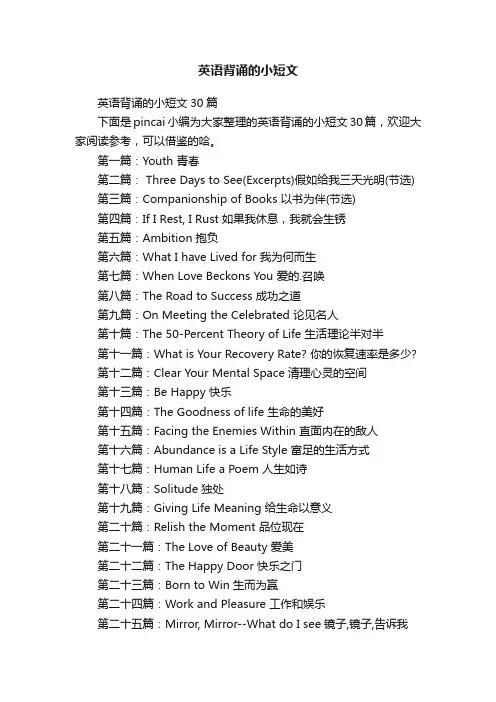
英语背诵的小短文英语背诵的小短文30篇下面是pincai小编为大家整理的英语背诵的小短文30篇,欢迎大家阅读参考,可以借鉴的哈。
第一篇:Youth 青春第二篇: Three Days to See(Excerpts)假如给我三天光明(节选) 第三篇:Companionship of Books 以书为伴(节选)第四篇:If I Rest, I Rust 如果我休息,我就会生锈第五篇:Ambition 抱负第六篇:What I have Lived for 我为何而生第七篇:When Love Beckons You 爱的.召唤第八篇:The Road to Success 成功之道第九篇:On Meeting the Celebrated 论见名人第十篇:The 50-Percent Theory of Life 生活理论半对半第十一篇:What is Your Recovery Rate? 你的恢复速率是多少?第十二篇:Clear Your Mental Space 清理心灵的空间第十三篇:Be Happy 快乐第十四篇:The Goodness of life 生命的美好第十五篇:Facing the Enemies Within 直面内在的敌人第十六篇:Abundance is a Life Style 富足的生活方式第十七篇:Human Life a Poem 人生如诗第十八篇:Solitude 独处第十九篇:Giving Life Meaning 给生命以意义第二十篇:Relish the Moment 品位现在第二十一篇:The Love of Beauty 爱美第二十二篇:The Happy Door 快乐之门第二十三篇:Born to Win 生而为赢第二十四篇:Work and Pleasure 工作和娱乐第二十五篇:Mirror, Mirror--What do I see镜子,镜子,告诉我第二十六篇:On Motes and Beams 微尘与栋梁第二十七篇:An October Sunrise 十月的日出第二十八篇:To Be or Not to Be 生存还是毁灭第二十九篇:Gettysburg Address 葛底斯堡演说第三十篇:First Inaugural Address(Excerpts) 就职演讲(节选)。
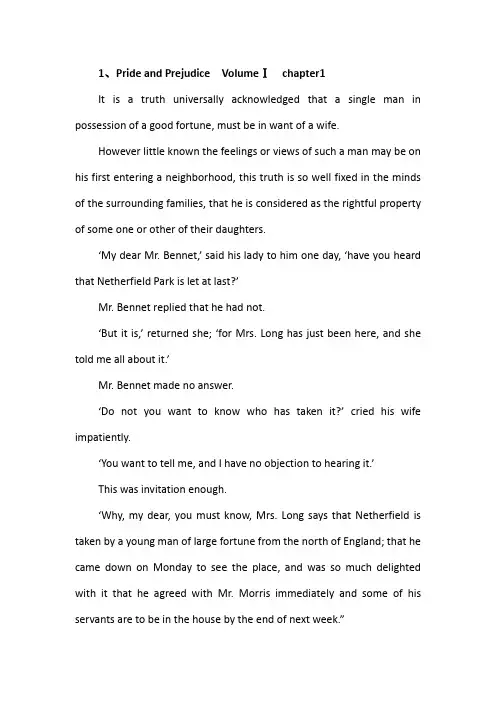
It is a truth universally acknowledged that a single man in possession of a good fortune, must be in want of a wife.However little known the feelings or views of such a man may be on his first entering a neighborhood, this truth is so well fixed in the minds of the surrounding families, that he is considered as the rightful property of some one or other of their daughters.‘My dear Mr. Bennet,’ said his lady to him one day, ‘have you heard that Netherfield Park is let at last?’Mr. Bennet replied that he had not.‘But it is,’ returned she; ‘for Mrs. Long has just been here, and she told me all about it.’Mr. Bennet made no answer.‘Do not you want to know who has taken it?’ cried his wife impatiently.‘You want to tell me, and I have no objection to hearing it.’This was invitation enough.‘Why, my dear, you must know, Mrs. Long says that Netherfield is taken by a young man of large fortune from the north of England; that he came down on Monday to see the place, and was so much delighted with it that he agreed with Mr. Morris immediately and some of his servants are to be in the house by the end of next week.”“My dear Lizzy, wher e can you have been walking to?”was a question which Elizabeth received from Jane as soon as she entered their room, and from all the others when they sat down to table. She had only to say in reply, that they had wandered about, till she was beyond her own knowledge. She colored as she spoke; but neither that, nor anything else, awakened a suspicion of the truth.The evening passed quietly, unmarked by anything extraordinary. The acknowledged lovers talked and laughed, the unacknowledged were silent. Darcy was not of a disposition in which happiness overflows in mirth; and Elizabeth, agitated and confused, rather knew that she was happy, than felt herself to be so; for, besides the immediate embarrassment, there were other evils before her. She anticipated what would be felt in the family when her situation became known; she was aware that no one liked him but Jane; and even feared that with the others it was a dislike which not all his fortune and consequence might do away.3、The little prince discovers a garden of roses"Good morning," he said. He was standing before a garden, all abloom with roses."Good morning," said the roses.The little prince gazed at them. They all looked like his flower. "Who are you?" he demanded, thunderstruck."We are roses," the roses said.And he was overcome with sadness. His flower had told him that she was the only one of her kind in all the universe. And here were five thousand of them, all alike, in one single garden!"She would be very much annoyed," he said to himself, "if she should see that... she would cough most dreadfully, and she would pretend that she was dying, to avoid being laughed at. And I should be obliged to pretend that I was nursing her back to life for if I did not do that, to humble myself also, she would really allow herself to die..."Then he went on with his reflections: "I thought that I was rich, with a flower that was unique in all the world; and all I had was a common rose. A common rose, and three volcanoes that come up to my knees and one of them perhaps extinct forever... that doesn’t make me a very great prince..."And he lay down in the grass and cried.4、The little prince consoles the narrator"All men have the stars," he answered, "but they are not the same things for different people. For some, who are travelers, the stars are guides. For others they are no more than little lights in the sky. For others, who are scholars, they are problems. For my businessman they were wealth. But all these stars are silent. You, you alone, will have the stars as no one else has them""What are you trying to say?""In one of the stars I shall be living. In one of them I shall be laughing. And so it will be as if all the stars were laughing, when you look at the sky at night... you, only you, will have stars that can laugh!"And he laughed again."And when your sorrow is comforted (time soothes all sorrows), you will be content that you have known me. You will always be my friend. You will want to laugh with me. And you will sometimes open your window, so, for that pleasure... and your friends will be properly astonished to see you laughing as you look up at the sky! Then you will say to them, ‘Yes, the stars always make me laugh!’ And they will think you are crazy. It will be a very shabby trick that I shall have played on you..."5、Three Days to SeeAll of us have read thrilling stories in which the hero had only a limited and specified time to live. Sometimes it was as long as a year; sometimes as short as twenty-four hours, but always we were interested in discovering just how the doomed man chose to spend his last days or his last hours. I speak, of course, of free men who have a choice, not condemned criminals whose sphere of activities is strictly delimited.Such stories set up thinking, wondering what we should do under similar circumstances. What associations should we crowd into those last hours as mortal beings? What happiness should we find in reviewing the past, what regrets?Sometimes I have thought it would be an excellent rule to live each day as if we should die tomorrow. Such an attitude would emphasize sharply the values of life. We should live each day with a gentleness, a vigor, and a keenness of appreciation which are often lost when time stretches before us in the constant panorama of more days and months and years to come.6、YouthYouth is not a time of life; it is a state of mind; it is not a matter of rosy cheeks, red lips and supple knees; it is a matter of the will, a quality of the imagination, a vigor of the emotions; it is the freshness of the deep springs of life.Youth means a temperamental predominance of courage over timidity, of the appetite for adventure over the love of ease. This often exists in a man of 60 more than a boy of 20. Nobody grows old merely by a number of years. We grow old by deserting our ideals.Whether 60 or 16, there is in every human being’s heart the lure of wonders, the unfailing appetite for what’s next and the joy of the game of living. In the center of your heart and my heart, there is a wireless station; so long as it receives messages of beauty, hope, courage and power from man and from the infinite, so long as you are young.When your aerials are down, and your spirit is covered with snows of cynicism and the ice of pessimism, then you’ve grown old, even at 20; but as long as your aerials are up, to catch waves of optimism, there’s hope you may die young at 80.7、A reason, season, or lifetimePeople come into your life for a reason, a season, or a lifetime.When someone is in your life for a REASON, it is usually to meet a need you have expressed. They have come to assist you through a difficulty, to provide you with guidance and support, to aid you physically, emotionally, or spiritually. They are there for the reason you need them to be. Then, this person will say or do something to bring the relationship to an end. Sometimes they walk away. Sometimes they act up and force you to take a stand. Sometimes they die. What we must realize is that our need has been met, their work is done, and now it is time to move on.When people come into your life for a SEASON, it is because your turn has come to share, grow, or learn. They bring you an experience of peace, or make you laugh. They may teach you something you have never done. They usually give you an unbelievable amount of joy, but only for a season.LIFETIME relationships teach you lifetime lessons; things you must build upon in order to have a solid emotional foundation. Your job is to accept the lesson, love the person, and put what you have learned to use in all other relationships and areas of your life.。
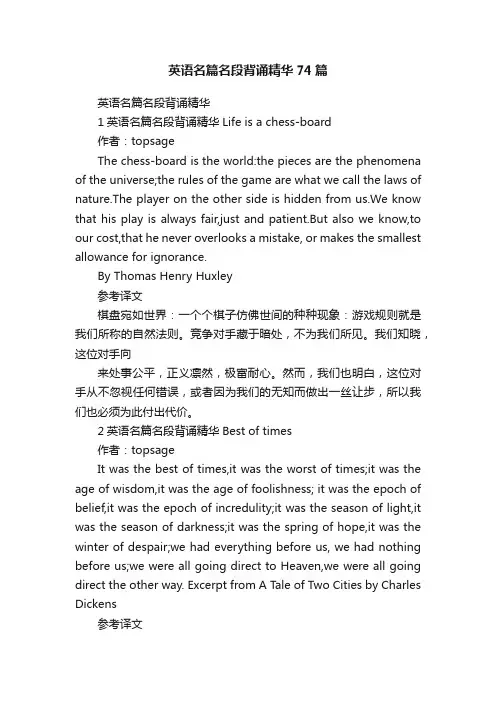
英语名篇名段背诵精华74篇英语名篇名段背诵精华1英语名篇名段背诵精华Life is a chess-board作者:topsageThe chess-board is the world:the pieces are the phenomena of the universe;the rules of the game are what we call the laws of nature.The player on the other side is hidden from us.We know that his play is always fair,just and patient.But also we know,to our cost,that he never overlooks a mistake, or makes the smallest allowance for ignorance.By Thomas Henry Huxley参考译文棋盘宛如世界:一个个棋子仿佛世间的种种现象:游戏规则就是我们所称的自然法则。
竞争对手藏于暗处,不为我们所见。
我们知晓,这位对手向来处事公平,正义凛然,极富耐心。
然而,我们也明白,这位对手从不忽视任何错误,或者因为我们的无知而做出一丝让步,所以我们也必须为此付出代价。
2英语名篇名段背诵精华Best of times作者:topsageIt was the best of times,it was the worst of times;it was the age of wisdom,it was the age of foolishness; it was the epoch of belief,it was the epoch of incredulity;it was the season of light,it was the season of darkness;it was the spring of hope,it was the winter of despair;we had everything before us, we had nothing before us;we were all going direct to Heaven,we were all going direct the other way. Excerpt from A T ale of Two Cities by Charles Dickens参考译文这是一个最好的时代,也是一个最坏的时代;这是明智的年代,这是愚昧的年代;这是信任的纪元,这是怀疑的纪元;这是光明的季节,这是黑暗的季节;这是希望的春日,这是失望的冬日;我们面前应有尽有,我们面前一无所有;我们都将直下地狱……3英语名篇名段背诵精华Equality and greatness 作者:topsage Equality and GreatnessBetween persons of equal income there is no social distinction except the distinction of merit.Money is nothing;character,conduct,and capacity areeverything.Instead of all the workers being leveled down to low wage standards and all the rich leveled up to fashionbale income standards,everybody under a system of equal incomes would find his or her own natural level.There would be great people and ordinary people and little peolpe,but the great would always be those who had done great things,and never the idiot whose mother had spoiled them and whose father had left a hunred thousand a year;and the little would be persons of small minds and mean characters,and not poor persons who had never had a chance.That is why idiots are always in favour of inequality of income(their only chance of eminence),and the really great in favour of equality.收入相当的人除了品性迥异以外没有社会差别。
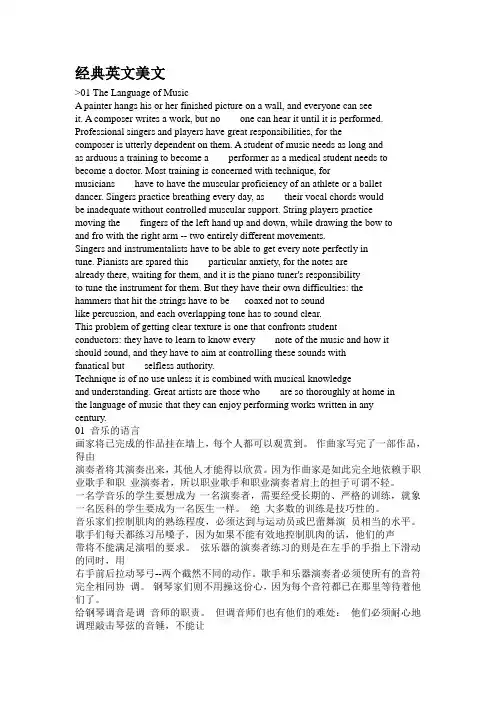
经典英文美文>01 The Language of MusicA painter hangs his or her finished picture on a wall, and everyone can seeit. A composer writes a work, but no one can hear it until it is performed. Professional singers and players have great responsibilities, for thecomposer is utterly dependent on them. A student of music needs as long andas arduous a training to become a performer as a medical student needs to become a doctor. Most training is concerned with technique, formusicians have to have the muscular proficiency of an athlete or a ballet dancer. Singers practice breathing every day, as their vocal chords wouldbe inadequate without controlled muscular support. String players practicemoving the fingers of the left hand up and down, while drawing the bow toand fro with the right arm -- two entirely different movements.Singers and instrumentalists have to be able to get every note perfectly intune. Pianists are spared this particular anxiety, for the notes arealready there, waiting for them, and it is the piano tuner's responsibilityto tune the instrument for them. But they have their own difficulties: thehammers that hit the strings have to be coaxed not to soundlike percussion, and each overlapping tone has to sound clear.This problem of getting clear texture is one that confronts studentconductors: they have to learn to know every note of the music and how it should sound, and they have to aim at controlling these sounds withfanatical but selfless authority.Technique is of no use unless it is combined with musical knowledgeand understanding. Great artists are those who are so thoroughly at home inthe language of music that they can enjoy performing works written in any century.01 音乐的语言画家将已完成的作品挂在墙上,每个人都可以观赏到。
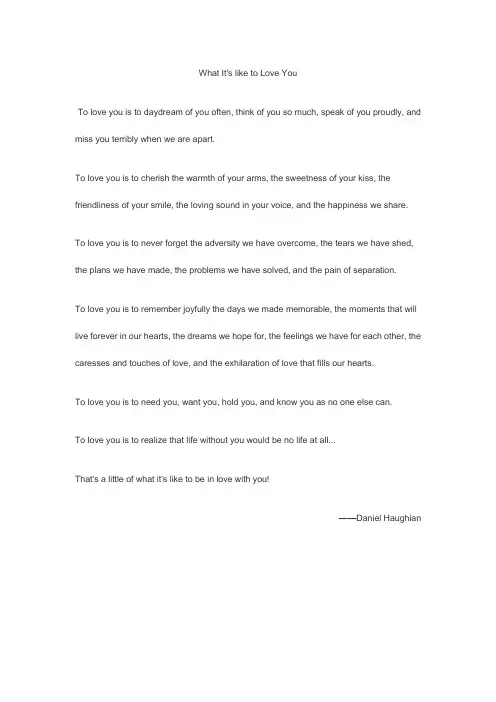
What It's like to Love YouTo love you is to daydream of you often, think of you so much, speak of you proudly, and miss you terribly when we are apart.To love you is to cherish the warmth of your arms, the sweetness of your kiss, the friendliness of your smile, the loving sound in your voice, and the happiness we share. To love you is to never forget the adversity we have overcome, the tears we have shed, the plans we have made, the problems we have solved, and the pain of separation.To love you is to remember joyfully the days we made memorable, the moments that will live forever in our hearts, the dreams we hope for, the feelings we have for each other, the caresses and touches of love, and the exhilaration of love that fills our hearts.To love you is to need you, want you, hold you, and know you as no one else can.To love you is to realize that life without you would be no life at all...That's a little of what it's like to be in love with you!——Daniel HaughianYou and I took a special chance--by Edmund O'NeillYou and I took a special chancethe first time we met...we both knew enough of love, and life, to understand thattwo people don't fall in love,they grow into it, slowly —and we'd both been hurt before by feelings that seemed too easily lost... but there was something between us from the beginninga unique harmony that made us take that special chance...You and I took a special chancethe first time we argued...after feeling hurt and sad, and both of us trying to apologizeat the same time for disagreeingover such a small matter, we knewthat our relationship was worth morethan anything that might come between us.We knew after that first timethat what we had togetherwould see us through the hard timesand make us better appreciate the good,because we took that special chance...You and I took a special chancethe first time we said "I love you"...for we knew that we would sharestormy as well as sunny times, laugher ans tears, some dreams thatwould come beautifully true, and othersthat would fade in our memories —and we knew in our heartsthat our love deserved all the effortwe could make to fulfill our life together...for we took that special chance...and found a very special love.--finish—Consider… YOU. In all time before now and in all time to come, there has never been and will never be anyone just like you. You are unique in the entire history and future of the universe. Wow! Stop and think about that. You're better than one in a million, or a billion, or a gazil lion…You are the only one like you in a sea of infinity!You're amazing! You're awesome! And by the way, TAG, you're it. As amazing and awesome as you already are, you can be even more so. Beautiful young people are the whimsey of nature, but beautiful old people are true works of art. But you don't become "beautiful" just by virtue of the aging process.Real beauty comes from learning, growing, and loving in the ways of life. That is the Art of Life. You can learn slowly, and sometimes painfully, by just waiting for life to happen to you. Or you can choose to accelerate your growth and intentionally devour life and all it offers. You are the artist that paints your future with the brush of today.Paint a Masterpiece.God gives every bird its food, but he doesn't throw it into its nest. Wherever you want to go, whatever you want to do, it's truly up to you.试想一下……你!一个空前绝后的你,不论是以往还是将来都不会有一个跟你一模一样的人。
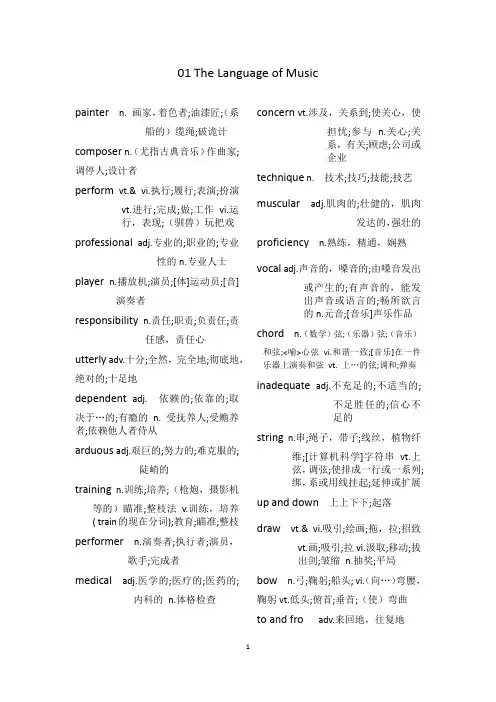
01 The Language of Musicpainter n. 画家,着色者;油漆匠;(系船的)缆绳;破诡计composer n.(尤指古典音乐)作曲家;调停人;设计者perform vt.& vi.执行;履行;表演;扮演vt.进行;完成;做;工作vi.运行,表现;(驯兽)玩把戏professional adj.专业的;职业的;专业性的n.专业人士player n.播放机;演员;[体]运动员;[音]演奏者responsibility n.责任;职责;负责任;责任感,责任心utterly adv.十分;全然,完全地;彻底地,绝对的;十足地dependent adj. 依赖的;依靠的;取决于…的;有瘾的n. 受抚养人;受赡养者;依赖他人者侍从arduous adj.艰巨的;努力的;难克服的;陡峭的training n.训练;培养;(枪炮,摄影机等的)瞄准;整枝法v.训练,培养( train的现在分词);教育;瞄准;整枝performer n.演奏者;执行者;演员,歌手;完成者medical adj.医学的;医疗的;医药的;内科的n.体格检查concern vt.涉及,关系到;使关心,使担忧;参与n.关心;关系,有关;顾虑;公司或企业technique n. 技术;技巧;技能;技艺muscular adj.肌肉的;壮健的,肌肉发达的,强壮的proficiency n.熟练,精通,娴熟vocal adj.声音的,嗓音的;由嗓音发出或产生的;有声音的,能发出声音或语言的;畅所欲言的n.元音;[音乐]声乐作品chord n.(数学)弦;(乐器)弦;(音乐)和弦;<喻>心弦vi.和谐一致;[音乐]在一件乐器上演奏和弦vt. 上…的弦;调和;弹奏inadequate adj.不充足的;不适当的;不足胜任的;信心不足的string n.串;绳子,带子;线丝,植物纤维;[计算机科学]字符串vt.上弦,调弦;使排成一行或一系列;绑,系或用线挂起;延伸或扩展up and down上上下下;起落draw vt.& vi.吸引;绘画;拖,拉;招致vt.画;吸引;拉vi.汲取;移动;拔出剑;皱缩n.抽奖;平局bow n.弓;鞠躬;船头; vi.(向…)弯腰,鞠躬vt.低头;俯首;垂首;(使)弯曲to and fro adv.来回地,往复地entirely adv.完全地;完整地;全部地;彻底地movement n.运动;活动;乐章;动作、举动instrumentalist n. 器乐家,乐器演奏者;<哲>工具主义者adj. <哲>工具主义(者)的perfectly adv.完美地;理想地;完全地;无瑕疵地pianist n.钢琴家;钢琴师;钢琴演奏者spare vt.节省,俭省;不用,抽出,省掉;宽恕,饶(命),救命,使某人免遭(麻烦等);出让,割爱,分让adj. 多余的,剩下的(钱等),空闲的(时间等);预备的,备用的,替换用的;多余的,瘦的,少量的;薄弱的,简陋的,粗陋的n.备用零件,备用轮胎;节省,俭省;〈美〉(头两个球把十柱打得)全倒;预备品,替换品vi.节约;节省;饶恕;宽容particular adj.特别的;详细的;独有的;挑剔的n.特色,特点;(可分类,列举的)项目;详细情节,细情,细目;某一事项tuner n.调音师;无线电收音机coax vt.哄;哄骗;用好话劝诱;轻轻地弄好vi.哄劝,劝诱n.同轴电缆;花言巧语;油嘴滑舌的人percussion n.敲打,碰撞;振动;<音>打击乐器;[医]扣诊法overlap n. 重叠部分;覆盖物,涂盖层;[数]交叠,相交vt.重叠;与…部分相同vi.互搭,重叠;部分相同;[数]有与…共同的某物tone n. [语]声调,语调;[画]色调,色泽,明暗;[乐]乐音,全音,全音程;[医](正常的)健康状态vt.使更健壮;定调;使变调子;[摄影术]给…上色vi.带有某种腔调;呈现某种色彩;(颜色)调和(与with 连用)texture n.质地;结构;本质v.使具有某种结构confront vt.面对;使面对面,使对质;碰到,遇到;比较conductor n.售票员;<电>导体;(乐队)指挥;导管(套管的一种)fanatical adj.狂热的;入迷的;狂信的n.狂热宗教徒;狂信者;入迷的人selfless adj.大公无私;无私的,忘我的;公而忘私authority n.权威;权力;学术权威;[复数]当权者combine v. 使结合;使化合;兼有;用联合收割机收割n.联合;联合收割机;联合集团;组合艺术品(由画,拼贴和构成派雕塑等拼凑而成的艺术品)thoroughly adv.彻底地;认真仔细地;完全地;非常century n.百年,一世纪;百个;(板球)一百分;<美>百元钞票02 Schooling and Education。
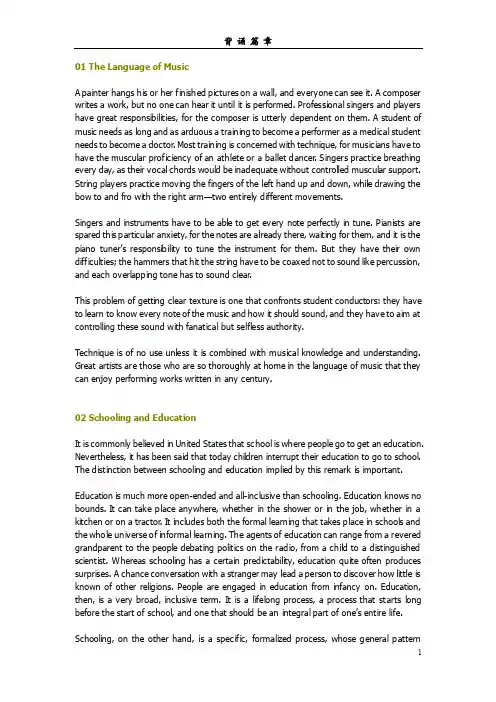
01 The Language of MusicA painter hangs his or her finished pictures on a wall, and everyone can see it. A composer writes a work, but no one can hear it until it is performed. Professional singers and players have great responsibilities, for the composer is utterly dependent on them. A student of music needs as long and as arduous a training to become a performer as a medical student needs to become a doctor. Most training is concerned with technique, for musicians have to have the muscular proficiency of an athlete or a ballet dancer. Singers practice breathing every day, as their vocal chords would be inadequate without controlled muscular support. String players practice moving the fingers of the left hand up and down, while drawing the bow to and fro with the right arm—two entirely different movements.Singers and instruments have to be able to get every note perfectly in tune. Pianists are spared this particular anxiety, for the notes are already there, waiting for them, and it is the piano tuner’s responsibility to tune the instrument for them. But they have their own difficulties; the hammers that hit the string have to be coaxed not to sound like percussion, and each overlapping tone has to sound clear.This problem of getting clear texture is one that confronts student conductors: they have to learn to know every note of the music and how it should sound, and they have to aim at controlling these sound with fanatical but selfless authority.Technique is of no use unless it is combined with musical knowledge and understanding. Great artists are those who are so thoroughly at home in the language of music that they can enjoy performing works written in any century.02 Schooling and EducationIt is commonly believed in United States that school is where people go to get an education. Nevertheless, it has been said that today children interrupt their education to go to school. The distinction between schooling and education implied by this remark is important.Education is much more open-ended and all-inclusive than schooling. Education knows no bounds. It can take place anywhere, whether in the shower or in the job, whether in a kitchen or on a tractor. It includes both the formal learning that takes place in schools and the whole universe of informal learning. The agents of education can range from a revered grandparent to the people debating politics on the radio, from a child to a distinguished scientist. Whereas schooling has a certain predictability, education quite often produces surprises. A chance conversation with a stranger may lead a person to discover how little is known of other religions. People are engaged in education from infancy on. Education, then, is a very broad, inclusive term. It is a lifelong process, a process that st arts long before the start of school, and one that should be an integral part of one’s entire life.Schooling, on the other hand, is a specific, formalized process, whose general patternvaries little from one setting to the next. Throughout a country, children arrive at school at approximately the same time, take assigned seats, are taught by an adult, use similar textbooks, do homework, take exams, and so on. The slices of reality that are to be learned, whether they are the alphabet or an understanding of the working of government, have usually been limited by the boundaries of the subject being taught. For example, high school students know that there not likely to find out in their classes the truth about political problems in their communities or what the newest filmmakers are experimenting with. There are definite conditions surrounding the formalized process of schooling.03 The Definition of “Price”Prices determine how resources are to be used. They are also the means by which products and services that are in limited supply are rationed among buyers. The price system of the United States is a complex network composed of the prices of all the products bought and sold in the economy as well as those of a myriad of services, including labor, professional, transportation, and public-utility services. The interrelationships of all these prices make up the ―system‖ of prices. The price of any particular product or service is linked to a broad, complicated system of prices in which everything seems to depend more or less upon everything else.If one were to ask a group of randomly selected individuals to define ―price‖, many would reply that price is an amount of money paid by the buyer to the seller of a product or service or, in other words that price is the money values of a product or service as agreed upon in a market transaction. This definition is, of course, valid as far as it goes. For a complete understanding of a price in any particular transaction, much more than the amount of money involved must be known. Both the buyer and the seller should be familiar with not only the money amount, but with the amount and quality of the product or service to be exchanged, the time and place at which the exchange will take place and payment will be made, the form of money to be used, the credit terms and discounts that apply to the transaction, guarantees on the product or service, delivery terms, return privileges, and other factors. In other words, both buyer and seller should be fully aware of all the factors that comprise the total ―package‖ being exchanged for the asked-for amount of money in order that they may evaluate a given price.04 ElectricityThe modern age is an age of electricity. People are so used to electric lights, radio, televisions, and telephones that it is hard to imagine what life would be like without them. When there is a power failure, people grope about in flickering candlelight, cars hesitate in the streets because there are no traffic lights to guide them, and food spoils in silent refrigerators.Yet, people began to understand how electricity works only a little more than two centuriesago. Nature has apparently been experimenting in this field for million of years. Scientists are discovering more and more that the liv ing world may hold many interesting secrets of electricity that could benefit humanity.All living cell send out tiny pulses of electricity. As the heart beats, it sends out pulses of record; they form an electrocardiogram, which a doctor can study to determine how well the heart is working. The brain, too, sends out brain waves of electricity, which can be recorded in an electroencephalogram. The electric currents generated by most living cells are extremely small – often so small that sensitive instruments are needed to record them. But in some animals, certain muscle cells have become so specialized as electrical generators that they do not work as muscle cells at all. When large numbers of these cell are linked together, the effects can be astonishing.The electric eel is an amazing storage battery. It can seed a jolt of as much as eight hundred volts of electricity through the water in which it live. ( An electric house current is only one hundred twenty volts.) As many as four-fifths of all the cells in the electric eel’s body are specialized for generating electricity, and the strength of the shock it can deliver corresponds roughly to length of its body.05 The Beginning of DramaThere are many theories about the beginning of drama in ancient Greece. The on most widely accepted today is based on the assumption that drama evolved from ritual. The argument for this view goes as follows. In the beginning, human beings viewed the natural forces of the world-even the seasonal changes-as unpredictable, and they sought through various means to control these unknown and feared powers. Those measures which appeared to bring the desired results were then retained and repeated until they hardened into fixed rituals. Eventually stories arose which explained or veiled the mysteries of the rites. As time passed some rituals were abandoned, but the stories, later called myths, persisted and provided material for art and drama.Those who believe that drama evolved out of ritual also argue that those rit es contained the seed of theater because music, dance, masks, and costumes were almost always used, Furthermore, a suitable site had to be provided for performances and when the entire community did not participate, a clear division was usually made between the "acting area" and the "auditorium." In addition, there were performers, and, since considerable importance was attached to avoiding mistakes in the enactment of rites, religious leaders usually assumed that task. Wearing masks and costumes, they often impersonated other people, animals, or supernatural beings, and mimed the desired effect-success in hunt or battle, the coming rain, the revival of the Sun-as an actor might. Eventually such dramatic representations were separated from religious activities.Another theory traces the theater's origin from the human interest in storytelling. According to this vies tales (about the hunt, war, or other feats) are gradually elaborated,at first through the use of impersonation, action, and dialogue by a narrator and then through the assumption of each of the roles by a different person. A closely related theory traces theater to those dances that are primarily rhythmical and gymnastic or that are imitations of animal movements and sounds.06 TelevisionTelevision-----the most pervasive and persuasive of modern technologies, marked by rapid change and growth-is moving into a new era, an era of extraordinary sophistication and versatility, which promises to reshape our lives and our world. It is an electronic revolution of sorts, made possible by the marriage of television and computer technologies.The word "television", derived from its Greek (tele: distant) and Latin (visio: sight) roots, can literally be interpreted as sight from a distance. Very simply put, it works in this way: through a sophisticated system of electronics, television provides the capability of converting an image (focused on a special photoconductive plate within a camera) into electronic impulses, which can be sent through a wire or cable. These impulses, when fed into a receiver (television set), can then be electronically reconstituted into that same image.Television is more than just an electronic system, however. It is a means of expression, as well as a vehicle for communication, and as such becomes a powerful tool for reaching other human beings.The field of television can be div ided into two categories determined by its means of transmission. First, there is broadcast television, which reaches the masses through broad-based airwave transmission of television signals. Second, there is nonbroadcast television, which provides for the needs of individuals or specific interest groups through controlled transmission techniques.Traditionally, telev ision has been a med ium of the masses. We are most familiar with broadcast television because it has been with us for about thirty-seven years in a form similar to what exists today. During those years, it has been controlled, for the most part, by the broadcast networks, ABC, NBC, and CBS, who have been the major purveyors of news, information, and entertainment. These giants of broadcasting have actually shaped not only television but our perception of it as well. We have come to look upon the picture tube as a source of entertainment, placing our role in this dynamic medium as the passive viewer.07 Andrew CarnegieAndrew Carnegie, known as the King of Steel, built the steel industry in the United States, and , in the process, became one of the wealthiest men in America. His success resulted inpart from his ability to sell the product and in part from his policy of expanding during periods of economic decline, when most of his competitors were reducing their investments.Carnegie believed that individuals should progress through hard work, but he also felt strongly that the wealthy should use their fortunes for the benefit of society. He opposed charity, preferring instead to provide educational opportunities that would allow others to help themselves. "He who dies rich, dies disgraced," he often said.Among his more noteworthy contributions to society are those that bear his name, including the Carnegie Institute of Pittsburgh, which has a library, a museum of fine arts, and a museum of national history. He also founded a school of technology that is now part of Carnegie-Mellon University. Other philanthrophic gifts are the Carnegie Endowment for International Peace to promote understanding between nations, the Carnegie Institute of Washington to fund scientific research, and Carnegie Hall to provide a center for the arts. Few Americans have been left untouched by Andrew Carnegie's generosity. His contributions of more than five million dollars established 2,500 libraries in small communities throughout the country and formed the nucleus of the public library system that we all enjoy today.08 American RevolutionThe American Revolution was not a sudden and v iolent overturning of the political and social framework, such as later occurred in France and Russia, when both were already independent nations. Significant changes were ushered in, but they were not breathtaking. What happened was accelerated evolution rather than outright revolution. During the conflict itself people went on working and praying, marrying and playing. Most of th em were not seriously disturbed by the actual fighting, and many of the more isolated communities scarcely knew that a war was on.America's War of Independence heralded the birth of three modern nations. One was Canada, which received its first large in flux of English-speaking population from the thousands of loyalists who fled there from the United States. Another was Australia, which became a penal colony now that America was no longer available for prisoners and debtors. The third newcomer-the United States-based itself squarely on republican principles.Yet even the political overturn was not so revolutionary as one might suppose. In some states, notably Connecticut and Rhode Island, the war largely ratified a colonial self-rule already existing. British officials, everywhere ousted, were replaced by a home-grown governing class, which promptly sought a local substitute for king and Parliament.09 SuburbanizationIf by "suburb" is meant an urban margin that grows more rapidly than its already developed interior, the process of suburbanization began during the emergence of the industrial city in the second quarter of the nineteenth century. Before that period the city was a small highly compact cluster in which people moved about on foot and goods were conveyed by horse and cart. But the early factories built in the 1840's were located along waterways and near railheads at the edges of cities, and housing was needed for the thousands of people drawn by the prospect of employment. In time, the factories were surrounded by proliferating mill towns of apartments and row houses that abutted the older, main cities. As a defense against this encroachment and to enlarge their tax bases, the cities appropriated their industrial neighbors. In 1854, for example, the city of Philadelphia annexed most of Philadelphia County. Similar municipal maneuvers took place in Chicago and in New York. Indeed, most great cities of the United States achieved such status only by incorporating the communities along their borders.With the acceleration of industrial growth came acute urban crowding and accompanying social stress-conditions that began to approach disastrous proportions when, in 1888, the first commercially successful electric traction line was developed. Within a few years the horse-drawn trolleys were retired and electric streetcar networks crisscrossed and connected every major urban area, fostering a wave of suburbanization that transformed the compact industrial city into a dispersed metropolis. This first phase of mass-scale suburbanization was reinforced by the simultaneous emergence of the urban Middle Class, whose desires for homeownership in neighborhoods far from the aging inner city were satisfied by the developers of single-family housing tracts.10 Types of SpeechStandard usage includes those words and expressions understood, used, and accepted by a majority of the speakers of a language in any situation regardless of the level of formality. As such, these words and expressions are well defined and listed in standard dictionaries. Colloquialisms, on the other hand, are familiar words and idioms that are understood by almost all speakers of a language and used in informal speech or writing, but not considered appropriate for more formal situations. Almost all idiomatic expressions are colloquial language. Slang, however, refers to words and expressions understood by a large number of speakers but not accepted as good, formal usage by the majority. Colloquial expressions and even slang may be found in standard dictionaries but will be so identified. Both colloquial usage and slang are more common in speech than in writing. Colloquial speech often passes into standard speech. Some slang also passes into standard speech, but other slang expressions enjoy momentary popularity followed by obscurity. In some cases, the majority never accepts certain slang phrases but nevertheless retains them in their collective memories. Every generation seems to require its own set of words to describe familiar objects and events. It has been pointed out by a number of linguists that three cultural conditions are necessary for the creation of a large body of slangexpressions. First, the introduction and acceptance of new objects and situations in the society; second, a diverse population with a large number of subgroups; third, association among the subgroups and the majority population.Finally, it is worth noting that the terms "standard" "colloquial" and "slang" exist only as abstract labels for scholars who study language. Only a tiny number of the speakers of any language will be aware that they are using colloquial or slang expressions. Most speakers of English will, during appropriate situations, select and use all three types of expressions.。
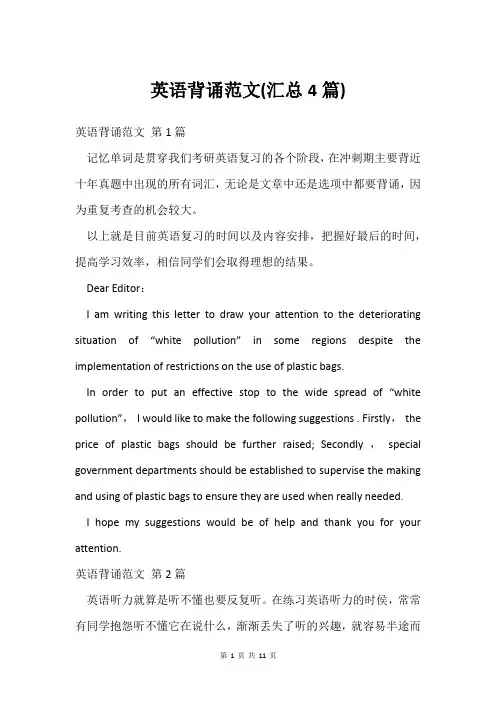
英语背诵范文(汇总4篇)英语背诵范文第1篇记忆单词是贯穿我们考研英语复习的各个阶段,在冲刺期主要背近十年真题中出现的所有词汇,无论是文章中还是选项中都要背诵,因为重复考查的机会较大。
以上就是目前英语复习的时间以及内容安排,把握好最后的时间,提高学习效率,相信同学们会取得理想的结果。
Dear Editor:I am writing this letter to draw your attention to the deteriorating situation of “white pollution” in some regions despite the implementation of restrictions on the use of plastic bags.In order to put an effective stop to the wide spread of “white pollution”,I would like to make the following suggestions . Firstly,the price of plastic bags should be further raised; Secondly ,special government departments should be established to supervise the making and using of plastic bags to ensure they are used when really needed.I hope my suggestions would be of help and thank you for your attention.英语背诵范文第2篇英语听力就算是听不懂也要反复听。
在练习英语听力的时侯,常常有同学抱怨听不懂它在说什么,渐渐丢失了听的兴趣,就容易半途而废。
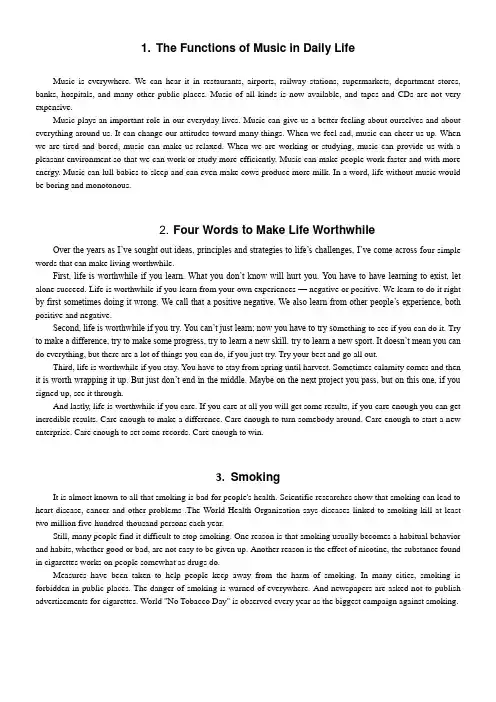
1. The Functions of Music in Daily LifeMusic is everywhere. We can hear it in restaurants, airports, railway stations, supermarkets, department stores, banks, hospitals, and many other public places. Music of all kinds is now available, and tapes and CDs are not very expensive.Music plays an important role in our everyday lives. Music can give us a better feeling about ourselves and about everything around us. It can change our attitudes toward many things. When we feel sad, music can cheer us up. When we are tired and bored, music can make us relaxed. When we are working or studying, music can provide us with a pleasant environment so that we can work or study more efficiently. Music can make people work faster and with more energy. Music can lull babies to sleep and can even make cows produce more milk. In a word, life without music would be boring and monotonous.2. Four Words to Make Life WorthwhileOver the years as I’ve sought out ideas, principles and strategies to life’s challenges, I’ve come across f our simple words that can make living worthwhile.First, life is worthwhile if you learn. What you don’t know will hurt you. You have to have learning to exist, let alone succeed. Life is worthwhile if you learn from your own experiences — negative or positive. We learn to do it right by first sometimes doing it wrong. We call that a positive negative. We also learn from other people’s experience, both positive and negative.Second, life is worthwhile if you try. You can’t just learn; now you have to try so mething to see if you can do it. Try to make a difference, try to make some progress, try to learn a new skill, try to learn a new sport. It doesn’t mean you can do everything, but there are a lot of things you can do, if you just try. Try your best and go all out.Third, life is worthwhile if you stay. You have to stay from spring until harvest. Sometimes calamity comes and then it is worth wrapping it up. But just don’t end in the middle. Maybe on the next project you pass, but on this one, if you signed up, see it through.And lastly, life is worthwhile if you care. If you care at all you will get some results, if you care enough you can get incredible results. Care enough to make a difference. Care enough to turn somebody around. Care enough to start a new enterprise. Care enough to set some records. Care enough to win.3.SmokingIt is almost known to all that smoking is bad for people's health. Scientific researches show that smoking can lead to heart disease, cancer and other problems .The World Health Organization says diseases linked to smoking kill at least two million five-hundred-thousand persons each year.Still, many people find it difficult to stop smoking. One reason is that smoking usually becomes a habitual behavior and habits, whether good or bad, are not easy to be given up. Another reason is the effect of nicotine, the substance found in cigarettes works on people somewhat as drugs do.Measures have been taken to help people keep away from the harm of smoking. In many cities, smoking is forbidden in public places. The danger of smoking is warned of everywhere. And newspapers are asked not to publish advertisements for cigarettes. World "No Tobacco Day" is observed every year as the biggest campaign against smoking.4. 创建和谐的宿舍生活1. 宿舍生活有时会出现不和谐的情况;2. 一个和谐宿舍生活的必要性;3. 如何创造和谐的宿舍生活。
[值得背诵的英语短文阅读] 英语口语背诵短文英语写作不仅是一种沟通与交流的渠道,更是衡量学生英语学习综合能力的重要指标。
小编精心收集了值得背诵的英语短文,供大家欣赏学习!值得背诵的英语短文篇1 There is a famous saying that it is better to be famous at the early age. With the development of the mass media, people can get fame much easier than before, so there are more and more children get famous. Early in the 1990s, the girl twins became the most young person to be famous, they took the ads when they were two. Since then, they played the role in the comedy. They are Olsen twins, who are the most popular twins in the world. The amazing thing is that they became the smallest producers when they were only six. What’s more, before they went to college, they started to run their clother brand. The Olsen twins get a so successful career, they are still very young now and they become the one of the power women in the world.有句著名的话叫做出名要趁早。
第一篇:一位伟大的朋友A Great FriendAs I am now a senior high school student, I have a great many friends, but there is one whom I prize over all the rest. I first made his acquaintance when I began to go to school. He has been my constant companion ever since.Though he is serious in appearance, he never fails to be interesting. Often he is clever, sometimes even merry and gay. He is the most knowledgeable friend a person could have. He knows virtually every language of the world, all the events of history, and the words of all the great poets and philosophers. A kindly benefactor, he is admired and enjoyed by everyone who makes his acquaintance.To me, he has been a great teacher as well as a friend. He first taught me the secrets of my own language and then those of others. With these keys he showed us how to unlock all the arts and sciences of man.My friend is endlessly patient. Dull though I may be, I can return to him again and again, and he is always ready to teach me. When I am bored, he entertains me. When I am dispirited, he lifts me up. When I am lonely, he keeps me company. He is a friend not only to me but to millions around the world. Shall I tell you his name? His name is “reading”.第一篇:翻译由于我现在是高中生,因此有许多朋友,但我最看重其中的一位。
关于英语背诵短文大全背诵是一种非常重要的教学手段,尤其在初中英语教学中。
小编精心收集了关于英语背诵短文,供大家欣赏学习!关于英语背诵短文篇1很棒的班级Hello, everyone. I’m Liang Xinying. I’m from 0406. I think our class is the best class in our school. I don’t know what you think about 0406. Never mind, let me tell you about 0406. I’m sure you will love it!Look, what a nice classroom it is! You can see some beautiful pictures on the wall. Can you see the tidy floor? If you go into the classroom of 0406, you will feel very comfortable. The students in 0406 are very friendly. The boys are clever and helpful. They like sports very much, because they know more exercise is good for them. They are all very healthy. The girls in 0406 are very hard-working and careful. They like reading very much. Sometimes, they like chatting with each other and talking about stars. They have lots of things to do all day, so they are very busy. They also like exercising. They think that it’s also important for girls to exercise. Look! Who are they? Oh, they are the teachers of 0406.I think they know everything. They love their students and work hard all day. We all love them too. Oh, what a great class it is!What nice students! What funny teachers! What a nice classroom!Dear friend, now Do you know 0406? Do you love 0406, too? What do you think of 0406?I think, you must love it very much, right?你好,每个人都。
大学英语背诵工程——经典篇1. The Nature of HappinessI live in Hollywood. You may think people in such a glamorous, fun filled place are happier than others. If so, you have some mistaken ideas about the nature of happiness.Many intelligent people still equate happiness with fun. The truth is that fun and happiness have little or nothing in common. Fun is what we experience during an act. Happiness is what we experience after an act. It is a deeper, more abiding emotion.Going to an amusement park or ball game, watching a movie or television, are fun activities that help us relax, temporarily forget our problems and maybe even laugh. But they do not bring happiness, because their positive effects end when the fun ends.I have often thought that if Hollywood stars have a role to play, it is to teach us that happiness has nothing to do with fun. These rich, beautiful individuals have constant access to glamorous parties, fancy cars, expensive homes, everything that spells “happiness”. But in memoir after memoir, celebrities reveal the unhappiness hidden beneath all their fun: depression, alcoholism, drug addiction, broken marriages, troubled children, and profound loneliness.The way people cling to the belief that a fun filled, pain-free life equates happiness actually diminishes their chances of ever attaining real happiness. If fun and pleasure are equated with happiness, then pain must be equated with unhappiness. But, in fact, the opposite is true: More times than not, things that lead to happiness involve some pain.As a result, many people avoid the very endeavors that are the source of true happiness. They fear the pain inevitably brought by such things as marriage, raising children, professional achievement, religious commitment, civic or charitable work and self-improvement. (283 words)参考译文幸福的本质我住在好莱坞。
英语背诵的小短文30篇下面是unjs小编为大家整理的英语背诵的小短文30篇,欢迎大家阅读参考,可以借鉴的哈。
第一篇:Youth 青春第二篇: Three Days to See(Excerpts)假如给我三天光明(节选) 第三篇:Companionship of Books 以书为伴(节选)第四篇:If I Rest, I Rust 如果我休息,我就会生锈第五篇:Ambition 抱负第六篇:What I have Lived for 我为何而生第七篇:When Love Beckons You 爱的召唤第八篇:The Road to Success 成功之道第九篇:On Meeting the Celebrated 论见名人第十篇:The 50-Percent Theory of Life 生活理论半对半第十一篇:What is Your Recovery Rate? 你的恢复速率是多少?第十二篇:Clear Your Mental Space 清理心灵的空间第十三篇:Be Happy 快乐第十四篇:The Goodness of life 生命的美好第十五篇:Facing the Enemies Within 直面内在的敌人第十六篇:Abundance is a Life Style 富足的生活方式第十七篇:Human Life a Poem 人生如诗第十八篇:Solitude 独处第十九篇:Giving Life Meaning 给生命以意义第二十篇:Relish the Moment 品位现在第二十一篇:The Love of Beauty 爱美第二十二篇:The Happy Door 快乐之门第二十三篇:Born to Win 生而为赢第二十四篇:Work and Pleasure 工作和娱乐第二十五篇:Mirror, Mirror--What do I see镜子,镜子,告诉我第二十六篇:On Motes and Beams 微尘与栋梁第二十七篇:An October Sunrise 十月的日出第二十八篇:To Be or Not to Be 生存还是毁灭第二十九篇:Gettysburg Address 葛底斯堡演说第三十篇:First Inaugural Address(Excerpts) 就职演讲(节选) [英语背诵的小短文30篇]。
英语专业学生英文语篇背诵集锦 说明: 1. 背诵检查对象:本语篇背诵计划针对我院英语专业一、二、三年级学生。学生们每学期必须完成相应篇目的欣赏和背诵。 2. 背诵检查实施:一、二年级学生由其“基础英语”任课教师安排时间进行背诵验收,三年级学生由其“高级英语”任课教师安排时间进行验收,建议在期末考试试题中加入背诵部分考核。 3. 欣赏要求:学生除了完成背诵任务以外,还必须写一篇英文背诵感言(200词)。 4. 背诵成绩评定:背诵成绩采用百分制,由任课教师评定,每篇文章学生背诵成绩必须达到合格等级,可多次背诵,直至合格,学生背诵成绩计入“基础英语”和“高级英语”课程成绩。 5. 其他要求:学生在完成规定的语篇背诵外,可由任课老师帮助或自己选择一些文章进行背诵。
英语专业学生英文语篇背诵集锦 目录: 一年级第一学期 1. Schooling and Education 2. The Life I Desired 3. A Tale of Two Cities (Excerpts) 4. Ambition 5. Gettysburg Address
一年级第二学期 1. Born to Win 2. Youth 3. David Copperfield (Excerpts) 4. The Happy Door 5. If I Rest, I Rust
二年级第一学期 1. Those Winter Sundays 2. The First Snow 3. On Meeting the Celebrated 4. When Love Beckons You 5. Pride and Prejudice (Excerpts)
二年级第二学期 1. Three Days to See (Excerpts) 2. The Goodness of Life 3. The Love of Beauty 4. The Road to Success 5. Life is a Chess-board 三年级第一学期 1. Companionship of Books 2. What I have Lived for 3. Work and Pleasure 4. Mirror, Mirror—What Do I See 5. Human Life a Poem
三年级第二学期 1. To Be or Not to Be 2. What is Your Recovery Rate? 3. The Joys of Writing 4. An October Sunrise 5. Be Happy!
说明: 6. 背诵检查对象:本语篇背诵计划针对我院英语专业一、二、三年级学生。学生们每学期必须完成相应篇目的欣赏和背诵。 7. 背诵检查实施:一、二年级学生由其“基础英语”任课教师安排时间进行背诵检查,三年级学生由其“高级英语”任课教师安排时间进行检查,建议教师将背诵部分纳入该课程的期末考核中。 8. 欣赏要求:学生除了完成背诵任务以外,还必须写一篇英文背诵感言(一、二年级300字左右,三年级500字左右),可以就文章的写作风格、写作主旨、个人感悟等发表观点。 9. 背诵成绩评定:背诵成绩评定采用百分制,每篇文章学生背诵成绩必须达到合格等级。允许学生多次背诵,直至合格。学生背诵成绩计入“基础英语”和“高级英语”课程成绩。 10. 其他要求:学生在完成规定的背诵语篇外,可由任课老师帮助或自己选择一些文章进行背诵。
一年级第一学期 1. Schooling and Education 【导读】人们通常认为上学是为了受教育。然而现在却有人认为孩子们上学打断了他们受教育的过程。这种言论所暗示的上学和受教育之间的区别非常重要。
It is commonly believed in United States that school is where people go to get an education. Nevertheless, it has been said that today children interrupt their education to go to school. The distinction between schooling and education implied by this remark is important. Education is much more open-ended and all-inclusive than schooling. Education knows no bounds. It can take place anywhere, whether in the shower or in the job, whether in a kitchen or on a tractor. It includes both the formal learning that takes place in schools and the whole universe of informal learning. The agents of education can range from a revered grandparent to the people debating politics on the radio, from a child to a distinguished scientist. Whereas schooling has a certain predictability, education quite often produces surprises. A chance conversation with a stranger may lead a person to discover how little is known of other religions. People are engaged in education from infancy on. Education, then, is a very broad, inclusive term. It is a lifelong process, a process that starts long before the start of school, and one that should be an integral part of one‟s entire life. Schooling, on the other hand, is a specific, formalized process, whose general pattern varies little from one setting to the next. Throughout a country, children arrive at school at approximately the same time, take assigned seats, are taught by an adult, use similar textbooks, do homework, take exams, and so on. The slices of reality that are to be learned, whether they are the alphabet or an understanding of the working of government, have usually been limited by the boundaries of the subject being taught. For example, high school students know that there not likely to find out in their classes the truth about political problems in their communities or what the newest filmmakers are experimenting with. There are definite conditions surrounding the formalized process of schooling.
【注释】 interrupt: 打断,中断 distinction: 差别,区分 bound: 范围,界限 predictability: 可预见性 infancy: 婴儿期,幼年 alphabet: 字母表 【参考译文】 人们通常认为上学是为了受教育。然而现在却有人认为孩子们上学打断了他们受教育的过程。这种言论中所暗示的上学和受教育之间的区别非常重要。 与上学相比,教育更具开放性,内容更广泛。教育不受任何限制。它可以在任何场合下进行,不管在淋浴时还是在工作时,不管在厨房里还是在拖拉机上。它既包括在学校所受的正规教育,也包括一切非正规教育。传授知识的人可以是德高望重的老者,可以是收音机里进行政治辩论的人们,可以是小孩子,也可以是知名的科学家。上学读书多少有点可预见性,而教育往往能带来意外的发现。与陌生人偶然的一次谈话可能会使人认识到自己对其宗教所知甚少。人们从幼时起就开始受教育。因此,教育是一个内涵很丰富的词。它是一生的过程,早在人们上学之前就开始了,并应成为整个生命完整的一部分。
【Your Comments】
背诵成绩: 检查时间: 教师签名: 2. The Life I Desired (by William Somerset Maugham) 【导读】英国小说家、剧作家威廉·萨姆塞特·毛姆 (William Somerset Maugham),是二十世纪最受读者欢迎的作家之一。作品以其对人性敏锐深刻的洞察、睿智活泼的语言、旖旎的异国情调赢得了广泛的赞誉。毛姆晚年由于文学上的成就受封爵位。
That must be the story of innumerable couples, and the pattern of life it offers has a homely grace. It reminds you of a placid rivulet, meandering smoothly through green pastures and shaded by pleasant trees, till at last it falls into the vasty sea; but the sea is so calm, so silent, so indifferent, that you are troubled suddenly by a vague uneasiness. Perhaps it is only by a kink in my nature, strong in me even in those days,